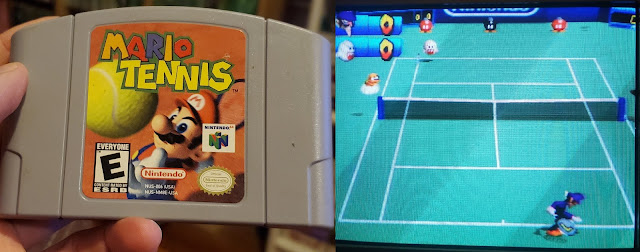Collection essentials #308: Jikkyou Oshaberi Parodius ~forever with me~ (Saturn)
Oop…I jumped ahead of the alphabetic order a bit. And jumped over one of my absolute favorite games, no less.
I first talked briefly about Jikkyou Oshaberi Parodius’s SNES iteration. This remake for the following generation of consoles came out a year later, enhanced with the more-powerful hardware and coming with a lot of changes. Unlike other Parodius games and most other shoot ‘em ups at the time, this game did not originate in arcades and did not even get an arcade release. And it shows, for the better.
This does feel like an arcade game at first, as the basic gameplay setup is the same. You choose one of many playable characters, and you’re tasked with getting through eight auto-scrolling levels, scoring as many points as you can along the way. Most of the levels are in some way a reference to other Konami games such as Lethal Enforcers, Goemon, TwinBee, and others, and they’re quite imaginative. The beautiful soundtrack often remixes songs from other Konami games along with some public domain stuff, though they also managed to get some 20th-century stuff in there, such as a remix of the popular song “That’s The Way (I Like It)” by KC & The Sunshine Band as well as “Diamond Head” by The Ventures.
One thing unique about this game is the 70 hidden fairies throughout the game’s levels. They are invisible, and the player must shoot at the spot on the screen where they’re hiding until the fairy appears, collecting a reward of many points (which often gets you an extra life). Once you eventually collect all 70 fairies (doesn’t have to be in the same run), you’ll unlock ANOTHER set of 70 fairies that are then added to the game’s level. Finding all 140 will unlock the final two playable characters, both forms of Kid Dracula from the Konami series of the same name.
One thing I appreciate about this game is the wide variety of difficulty levels. There are 8 total (the highest of which has to be unlocked), and they vary greatly in intensity. The lowest difficulty is an absolute cakewalk, the highest will mercilessly destroy you, and there’s everything in between. Any player can find one that is suitable for them, which is awesome.
Other things you wouldn’t normally see in a shoot ‘em up, due to JOP being developed with consoles in mind rather than the arcade, include a couple bonus areas separate from the main game, as well as the ability to save your game in up to three slots. The save feature is very handy when fairy hunting! There’s also a whopping EIGHTEEN total playable characters which is a ton for a shoot ‘em up, and they all have power-up bars that are at least somewhat unique. Many characters are similar, but even the small differences are still very much significant.
The Saturn version differs a bit from other versions of the game. I personally think it’s the best version. It has the least slowdown of all of them for the smoothest action. It is missing a certain feature that caused certain bonus stages to randomly appear at the end of stages. But in its place is “Extra”, which when turned on changes up various things in the game such as enemy formation, something that I think is really cool. You don’t see a feature like that in very many shoot ‘em ups.
Jikkyou Oshaberi Parodius was one of the earliest games that I imported, circa 2005, recommended by an internet friend of mine who had introduced me to the series. The copy shown above is the very same one I bought close to 20 years ago.
I absolutely adore this game, and even tops the incredible Gokujou Parodius which is already one of my favorites. If I could only play one shoot ‘em up for the rest of my life I’d probably pick this one. It may not blow you away the first time you ever play it, but it’s a game that packs an absolute ton of lasting value and can grow on you the more time you spend with it. It’s a shame that it has never seen a release outside Japan and has not been rereleased in any form in the past 17 years and counting. It’s truly a quintessential essential, and a terrific treasure in the Sega Saturn library.




Comments
Post a Comment